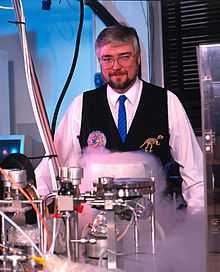Richard Corfield (scientist)
| Richard Corfield | |
|---|---|
 |
Richard Corfield (born 1962) is a scientist,[1][2][3][4] science writer[5] and broadcaster [6][7] based near Oxford in the United Kingdom. He received his B.Sc from Bristol University and his Ph.D from Cambridge University where he worked with Professor Sir Nicholas Shackleton FRS on the greenhouse effect during the Paleocene Epoch.
He is the Managing Director of the Science and Media consultancy Hanborough Consultants. He has written three books: Architects of Eternity: The New Science of Fossils,[8] The Silent Landscape: In the Wake of HMS Challenger[9][10] and Lives of the Planets; A Natural History of the Solar System.[11][12]
As well as contributing to magazines, on-line publications and newspapers such as Physics World,[13] Chemistry World,[14][15] Astrobiology.net,[16][17][18][19] Space.com,[20][21] and The Washington Post[22] he also wrote and appeared in the Newton Channel/Guardian documentary An Interview with Craig Venter.
He is also a regular contributor on radio, particularly to In Our Time[23][24][25][26][27][28][29][30] with Melvyn Bragg, The Material World and The Report.
References
- ↑ Corfield, R. M and Norris, R. D. "Deep Water Circulation in the Paleocene Ocean". Geological Society of London. Retrieved 15 October 2011.
- ↑ "Mechanisms of Climate Warming at the End of the Paleocene". Science. Retrieved 15 October 2011.
- ↑ Nature. "Termination of Global Warmth at the Palaeocene/Eocene boundary through productivity feedback" (PDF). Nature. Retrieved 15 October 2011.
- ↑ Proceedings of the Ocean Drilling Program. "The evolution of Antarctic surface waters during the Paleogene: Inferences from the stable isotopic composition of planktonic foraminifers, ODP Leg 113" (PDF). Ocean Drilling Program. Retrieved 15 October 2011.
- ↑ Corfield, Richard. "richardcorfield.com".
- ↑ "In Our Time". In Our Time. Retrieved 15 October 2011.
- ↑ "An Interview with Craig Venter". The Guardian (London). 26 November 2010. Retrieved 15 October 2011.
- ↑ Corfield, Richard. "Architects of Eternity: The New Science of Fossils". Retrieved 15 October 2011.
- ↑ Corfield, Richard. "The Silent Landscape: In the Wake of HMS Challenger". Retrieved 15 October 2011.
- ↑ Corfield, Richard. "The Silent Landscape: The Scientific Voyage of HMS Challenger". Joseph Henry Press (US edition). Retrieved 15 October 2011.
- ↑ Corfield, Richard. "Lives of the Planets: A Natural History of the Solar System". Basic Books. Retrieved 15 October 2011.
- ↑ Corfield, Richard. "La Vida de los Planetas". Perfect Paperback. Retrieved 15 October 2011.
- ↑ Physics, World. "Sputnik's Legacy" (PDF). Institute of Physics. Retrieved 15 October 2011.
- ↑ Chemistry, World. "Identifying the Lost Soldiers of Fromelles" (PDF). Royal Society of Chemistry. Retrieved 15 October 2011.
- ↑ Chemistry, World. "Houston, we've had a problem" (PDF). Royal Society of Chemistry. Retrieved 15 October 2011.
- ↑ Astrobiology.net. "The Shoulders of Giants". NASA. Retrieved 15 October 2011.
- ↑ Astrobiology.net. "Fantastic Voyage". NASA. Retrieved 15 October 2011.
- ↑ Astrobiology.net. "The Brotherhood of Speed: Part 1". NASA. Retrieved 15 October 2011.
- ↑ Astrobiology.net. "The Brotherhood of Speed part 2: Lifting to Space". Retrieved 15 October 2011.
- ↑ space.com. "Path to the Sky: The Birth of the Space Shuttle: Part 1".
- ↑ Space.com. "Path to the Sky: The Birth of the Space Shuttle: Part 2". Retrieved 15 October 2011.
- ↑ "The Day the Astronauts Died". The Washington Post. 28 January 2007. Retrieved 15 October 2011.
- ↑ In Our Time. "Aging the Earth". Retrieved 15 October 2011.
- ↑ In Our Time. "Ediacara Biota". BBC. Retrieved 15 October 2011.
- ↑ In Our Time. "Fossils". BBC. Retrieved 15 October 2011.
- ↑ In Our Time. "Mammals". BBC. Retrieved 15 October 2011.
- ↑ In Our Time. "The Cambrian Period". Retrieved 15 October 2011.
- ↑ In Our Time. "The Geological Formation of Britain". Retrieved 15 October 2011.
- ↑ In Our Time. "The Origins of Life". BBC. Retrieved 15 October 2011.
- ↑ In Our Time. "The Permian-Triassic Boundary". BBC. Retrieved 15 October 2011.